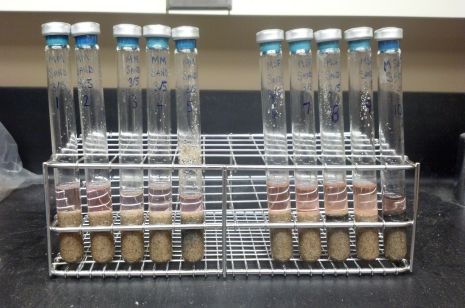Earth Organisms Survive Under Martian Conditions

Methanogens contained in these test tubes, which also contained growth nutrients, sand and water, survived when subjected to Martian freeze-thaw cycles at the University of Arkansas.
FAYETTEVILLE, Ark. – New research suggests that methanogens — among the simplest and oldest organisms on Earth — could survive on Mars.
Methanogens, microorganisms in the domain Archaea, use hydrogen as their energy source and carbon dioxide as their carbon source, to metabolize and produce methane, also known as natural gas. Methanogens live in swamps and marshes, but can also be found in the gut of cattle, termites and other herbivores as well as in dead and decaying matter.
Methanogens are anaerobic, so they they don’t require require oxygen. They don’t require organic nutrients and are non-photosynthetic, indicating they could exist in sub-surface environments and therefore are ideal candidates for life on Mars.
Rebecca Mickol, a doctoral student in space and planetary sciences at the University of Arkansas, subjected two species of methanogens to Martian conditions: Methanothermobacter wolfeii and Methanobacterium formicicum. Both species survived the Martian freeze-thaw cycles that Mickol replicated in her experiments.
The species were tested for their ability to withstand Martian freeze-thaw cycles that are below the organisms’ ideal growth temperatures: 37 degrees Celsius (98.6 degrees Fahrenheit) for M. formicicum and 55 degrees Celsius (131 degrees Fahrenheit) for M. wolfeii.
“The surface temperature on Mars varies widely, often ranging between minus 90 degrees Celsius and 27 degrees Celsius over one Martian day,” Mickol said. “If any life were to exist on Mars right now, it would at least have to survive that temperature range. The survival of these two methanogen species exposed to long-term freeze/thaw cycles suggests methanogens could potentially inhabit the subsurface of Mars.”
Mickol conducted the study with Timothy Kral, professor of biological sciences in the Arkansas Center for Space and Planetary Sciences and lead scientist on the project. She is presenting her work at the 2014 General Meeting of the American Society for Microbiology, being held May 17-20 in Boston.
The two species were selected because one is a hyperthermophile, meaning it thrives under extremely hot temperatures, and the other is a thermophile, which thrives under warm temperatures.
“The low temperature on Mars inhibited their growth, but they survived,” Mickol said. “Once they got back to a warm temperature, they were able to grow and metabolize again. I wanted to see if these cold temperatures would kill them, or if they were able to survive and adapt.”
Since the 1990s, Kral has been studying methanogens and examining their ability to survive on Mars. In 2004, scientists discovered methane in the Martian atmosphere, and immediately the question of the source became an important one.
“When they made that discovery, we were really excited because you ask the question ‘What’s the source of that methane?’” Kral said. “One possibility would be methanogens.”
Mickol is currently interning at the Kennedy Space Center in Florida. The NASA Exobiology Program funded her research.
The Arkansas Center for Space and Planetary Sciences, founded in 2000, is an interdisciplinary research institute at the University of Arkansas with 25 graduate students and nearly $3 million in awarded grants.
The University of Arkansas is the flagship institution of the University of Arkansas System and the premier research institution in the state. The Carnegie Foundation for the Advancement of Teaching categorizes the University of Arkansas in its highest research classification, a level that only 2 percent of American colleges and universities share.
Topics
Contacts
Timothy Kral, professor, biological sciences
J. William Fulbright College of Arts and Sciences
479-575-6338,
tkral@uark.edu
Rebecca Mickol, doctoral student
Arkansas Center for Space and Planetary Sciences
585-233-0306,
rmickol@uark.edu
Chris Branam, research communications writer/editor
University Relations
479-575-4737,
cwbranam@uark.edu
Headlines
Affairs of the Heart
Find out how biomedical engineering professor Morten Jensen is developing innovative devices to produce better outcomes in cardiovascular medicine.
Students, Faculty and Alumni Kick Off Centennial Year of School of Law
Founded April 14, 1924, the School of Law faculty, students and alumni started the celebration of its centennial year with a Founders Day event and will continue with more commemorative events this coming fall.
Yearly Academic Award Winners, Ambassadors Recognized by Bumpers College
Schyler Angell, Lexi Dilbeck, Cason Frisby, Tanner Austin King, Anna Brooke Mathis, Carrie Ortel, Lucy Scholma, Kadence Trosper and student ambassadors were honored at the college's annual reception.
World Premiere of 'Cries from the Cotton Field' Slated for May 8
Cries from the Cotton Field chronicles the journey of 19th century Italian immigrants from northern Italy to the Arkansas Delta and ultimately to Tontitown. It will premier at 6 p.m. May 8 in Springdale Har-Ber High School.
Fay Jones School's Earth Day Event Spotlights Sustainable Materials and Projects
"One day doesn't seem like a lot, but one day can empower individuals and groups, energize them to work for change and innovate for transformative solutions," professor Jennifer Webb said of the students' design work.




